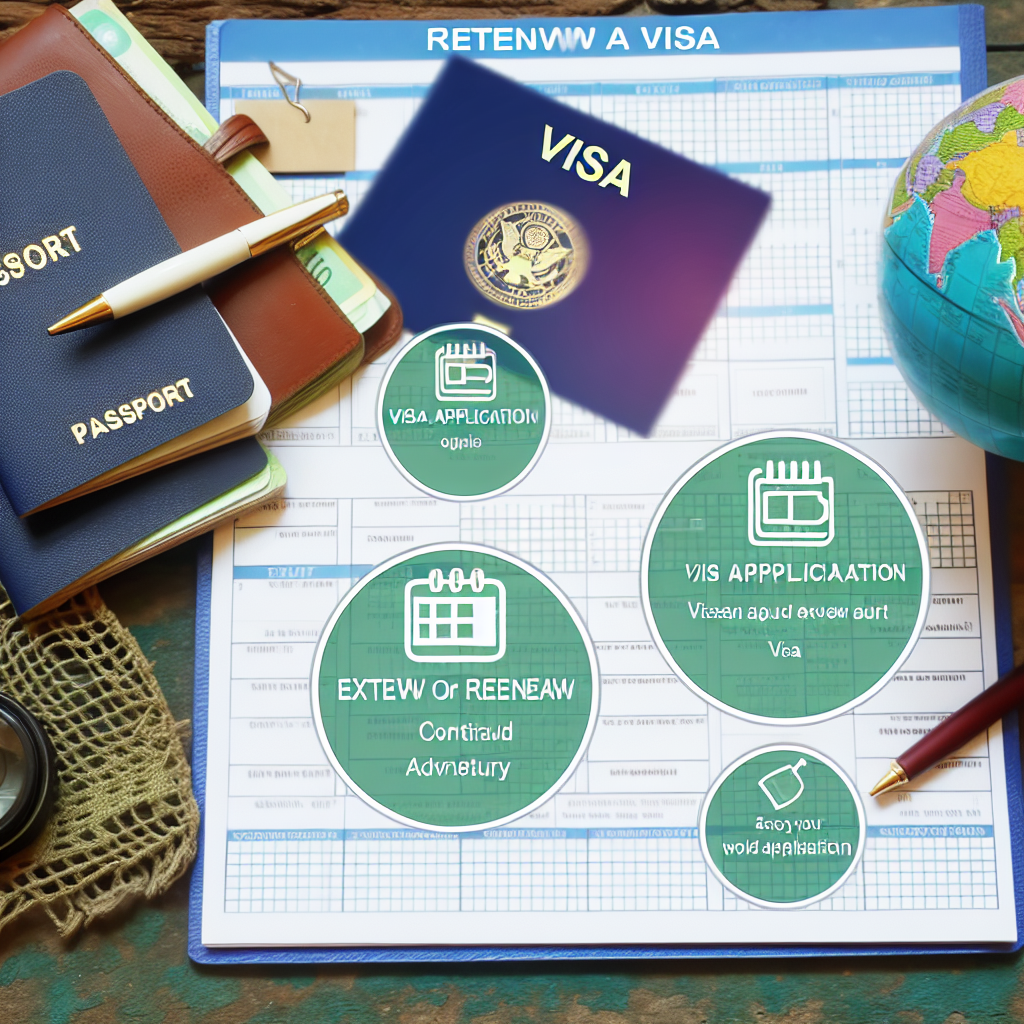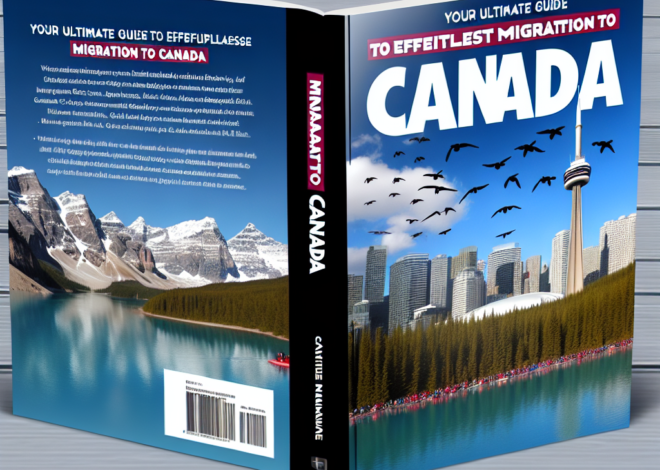
How to extend or renew your visa: Tips and tricks
-
Table of Contents
“Visa Renewal Made Easy: Expert Tips and Tricks for a Smooth Extension!”
Introduction
Navigating the process of extending or renewing a visa can be a daunting task, fraught with legal complexities and stringent deadlines. Whether you’re looking to continue your studies, extend a work assignment, or simply prolong your stay in a foreign country, understanding the nuances of visa extension is crucial. This guide aims to demystify the process, offering practical tips and tricks to enhance your chances of a successful application. From gathering the necessary documentation to understanding the specific requirements of your visa type, we will provide you with essential insights to help you navigate this complex process smoothly and efficiently.
Understanding Visa Extension Requirements: A Step-by-Step Guide
Navigating the complexities of visa extensions or renewals can be daunting, but with the right information and preparation, the process can be streamlined and stress-free. Understanding the specific requirements and timelines of your visa category is crucial in ensuring a successful extension or renewal application. This article provides a comprehensive guide on how to effectively manage this process.
Firstly, it is essential to determine the type of visa you currently hold, as different visas have different rules and procedures for extension or renewal. For instance, tourist visas, student visas, and work visas each have unique requirements and limitations. You should consult the official website of the immigration authority of the country you are in, as it will provide the most accurate and up-to-date information. This initial research phase is critical because it helps you gather all necessary documents and understand the timeframe you need to adhere to.
Once you have identified the specific requirements for your visa type, the next step is to check the expiration date of your current visa to ensure you apply in a timely manner. Many countries require that you apply for an extension or renewal several weeks or even months before your current visa expires. Delaying beyond this period can lead to complications, including penalties or, in some cases, deportation.
Gathering the required documentation is another pivotal step. Commonly required documents include your current passport, a completed application form, recent photographs, proof of financial means, and a document justifying the extension, such as a letter from an employer or an educational institution. In some cases, you might also need to provide evidence of health insurance coverage. It is advisable to create a checklist of these documents to ensure that nothing is overlooked.
Financial proof is a critical component of many visa extension applications. Authorities often require evidence that you can support yourself financially during your extended stay. This could be in the form of bank statements, pay slips, or a letter from a sponsor. Ensuring that these financial documents meet the stipulated requirements is key; they should not only show sufficient funds but also comply with any other specific criteria set by the immigration authority.
After assembling all necessary documents, the next step is to fill out the application form. It is important to complete this form with utmost accuracy and honesty. Any errors or discrepancies in the application can lead to delays or rejection of your application. If you are unsure about any part of the application, seeking advice from legal experts or consulting with the immigration office can be beneficial.
Once your application is ready, submit it according to the instructions provided by the immigration authority. This could be through an online system, by mail, or in person. Some countries also require an interview or biometric data collection as part of the application process. Being prepared for these additional requirements can help expedite the process.
Finally, after submitting your application, it is important to monitor its status. Many immigration authorities offer online tools where you can check the progress of your application. Staying informed about the status allows you to respond promptly to any requests for additional information or documentation.
In conclusion, while the process of extending or renewing a visa can seem complex, thorough preparation and understanding of the specific requirements can lead to a successful outcome. By carefully following each step and preparing well in advance of your visa’s expiration date, you can ensure a smoother experience and enjoy an extended stay in your host country.
Navigating the Visa Renewal Process: Essential Documents and Procedures
Navigating the visa renewal process can often seem daunting, but with the right preparation and understanding of the essential documents and procedures involved, it can be a smooth and successful endeavor. Whether you are looking to extend your stay for work, study, or tourism, being well-prepared is key. Here, we explore some critical tips and tricks to help you through the visa renewal or extension process.
Firstly, it is crucial to check the specific requirements of the country where you are applying for a visa renewal. Each country has its own set of rules and required documents, which can vary significantly. Generally, you will need to provide your current passport, which should be valid for at least six months beyond the period of your intended stay. Additionally, recent passport-sized photographs that meet the country’s specifications are usually required.
Another important document is the proof of your legal entry into the country, often in the form of your original visa and entry stamps. Alongside this, providing evidence of your reasons for extending your stay is essential. For instance, if you are renewing a student visa, you may need to provide proof of enrollment and academic progress from your institution. Similarly, for a work visa, an updated letter from your employer detailing your job position and the necessity of your prolonged stay might be necessary.
Moreover, financial stability is a key factor that immigration authorities consider. You must demonstrate that you have sufficient funds to support yourself during the extended period of your stay. Bank statements, pay slips, or a financial guarantee from a sponsor are typical documents that you might need to submit to prove your financial standing.
The timing of your application is also critical. It is advisable to apply for a renewal well before your current visa expires. This not only ensures that you remain in legal status but also gives you enough buffer in case of delays or additional documentation requests from the visa office. Immigration authorities generally recommend applying at least 90 days before your visa’s expiration date.
Once you have gathered all the necessary documentation, the next step is to fill out the relevant application forms. These forms can usually be found on the official website of the immigration authority of the country in question. It is imperative to fill out these forms accurately and completely, as any errors can delay the processing of your application.
After submitting your application, be prepared for the possibility of an interview. Not all visa renewals require an interview, but if it is required, it typically involves questions about your stay and your reasons for wanting to extend it. Being honest and providing clear, concise answers can help in making a favorable impression.
Finally, while waiting for your application to be processed, keep a copy of all your submitted documents and any correspondence with the visa office. This will be useful if you need to refer back to your application details or if you are asked to provide additional information.
In conclusion, while the process of renewing or extending a visa can be complex, thorough preparation and an understanding of the required documents and procedures can greatly enhance your chances of success. By planning ahead and ensuring all your documentation is in order, you can navigate this process with greater ease and confidence.
Tips for a Successful Visa Interview: Preparing for Common Questions
When preparing for a visa interview, it is crucial to anticipate and prepare for the common questions that consular officers typically ask. This preparation not only boosts your confidence but also increases your chances of a successful outcome. Here, we will explore effective strategies to handle these questions, ensuring you present yourself as a credible and prepared applicant.
Firstly, understanding the purpose of the interview is essential. The primary goal for the interviewer is to verify the information provided in your application and to assess whether you meet the criteria for the visa category you are applying for. Common questions often revolve around your reasons for visiting the country, the duration of your stay, your financial status, and your ties to your home country.
To effectively prepare for these questions, start by reviewing your application thoroughly. Be familiar with every detail you have provided as inconsistencies between your interview responses and your application can raise concerns about your credibility. It is advisable to practice your answers, but ensure they remain genuine and not overly rehearsed. This will help you to appear natural and confident during the interview.
Regarding questions about the purpose of your visit, be clear and concise in explaining your reasons. Whether it is for tourism, business, or study, provide a straightforward answer and, if possible, support it with evidence. For instance, if you are traveling for educational purposes, mention the specific course and the institution, and why you chose them. This shows that you have a clear plan in place.
Financial stability is another critical area that will be scrutinized during the interview. Be prepared to prove that you have sufficient funds to cover your stay. This could be through bank statements, employment letters, or scholarship awards. Demonstrating that you have strong financial ties to your home country can also be beneficial, as it reassures the interviewer of your intent to return after your visit.
Furthermore, expect to answer questions about your ties to your home country. Consular officers need to be convinced that you have compelling reasons to return home after your visit to the host country. Evidence of strong ties can include a job, family, property, or ongoing education in your home country. Be prepared to discuss these aspects of your life in detail to underscore your commitment to return.
Lastly, it is important to maintain a calm and respectful demeanor throughout the interview. Listen carefully to the questions asked and answer them directly and honestly. If you do not understand a question, it is perfectly acceptable to ask for clarification. Remember, the interview is not only about what you say but also how you say it. Being polite and composed speaks volumes about your character and respect for the visa process.
In conclusion, a successful visa interview requires thorough preparation and a clear understanding of what is expected of you. By anticipating common questions and preparing thoughtful, honest answers, you can demonstrate that you are a credible applicant who respects the visa process. This approach will not only help alleviate some of the stress associated with visa interviews but also enhance your chances of a favorable outcome.
Avoiding Common Mistakes in Visa Extension or Renewal Applications
When it comes to extending or renewing your visa, the process can often seem daunting. However, with careful planning and attention to detail, you can navigate this process smoothly and avoid common pitfalls that might jeopardize your application. Understanding these potential mistakes and learning how to circumvent them is crucial in ensuring a successful visa extension or renewal.
One of the most frequent errors applicants make is not checking the specific requirements of their visa category. Each visa type, whether a tourist, student, or work visa, has unique requirements and conditions that must be met for renewal or extension. For instance, work visas might require proof of ongoing employment or sponsorship, while student visas need evidence of continued enrollment and satisfactory progress in a course. Therefore, it is essential to thoroughly review the guidelines provided by the immigration authority of the country you are residing in to ensure that you meet all the criteria before you begin your application process.
Another common oversight is missing deadlines. Visa expiration dates are rigid, and failing to apply in time can lead to undesirable outcomes, including the necessity to leave the country or even bans on future entries. To avoid this, you should aim to start your renewal or extension process well in advance. A good rule of thumb is to initiate the procedure at least three months before your current visa expires. This buffer period allows ample time to gather all necessary documents without rushing, reducing the likelihood of errors in your application.
In addition to timing and specific requirements, correct documentation plays a pivotal role in the success of your visa application. Incomplete or incorrect documentation is a significant reason why many applications are delayed or rejected. Essential documents typically include your current passport, proof of financial means, a letter stating the reason for extension, and, depending on your visa type, additional supporting documents like employment letters, bank statements, or university admission letters. It is advisable to create a checklist of all required documents and cross-verify with the embassy or consulate to ensure no piece of paperwork is overlooked.
Moreover, paying close attention to the details within your application forms cannot be overstated. Even minor mistakes in names, dates, or other personal information can lead to the rejection of your visa application. Therefore, after filling out your application, double-check every entry meticulously. If possible, have another person review it as well to catch any errors you might have missed.
Lastly, understanding the financial aspect of renewing or extending your visa is also crucial. Ensure you are aware of all the fees associated with your application. These can vary widely depending on the type of visa and the country in question. Failing to submit the correct fee can result in processing delays or application denial. Additionally, some countries might require proof of payment as part of the application process, so keeping receipts and transaction details is advisable.
By being aware of these common mistakes and actively working to avoid them, you can enhance the likelihood of a smooth and successful visa renewal or extension process. Remember, the key is in the preparation. Taking the time to thoroughly understand and adhere to the specific requirements of your visa type, preparing your documentation carefully, and adhering to deadlines will put you in a strong position to continue your stay without legal interruptions.



